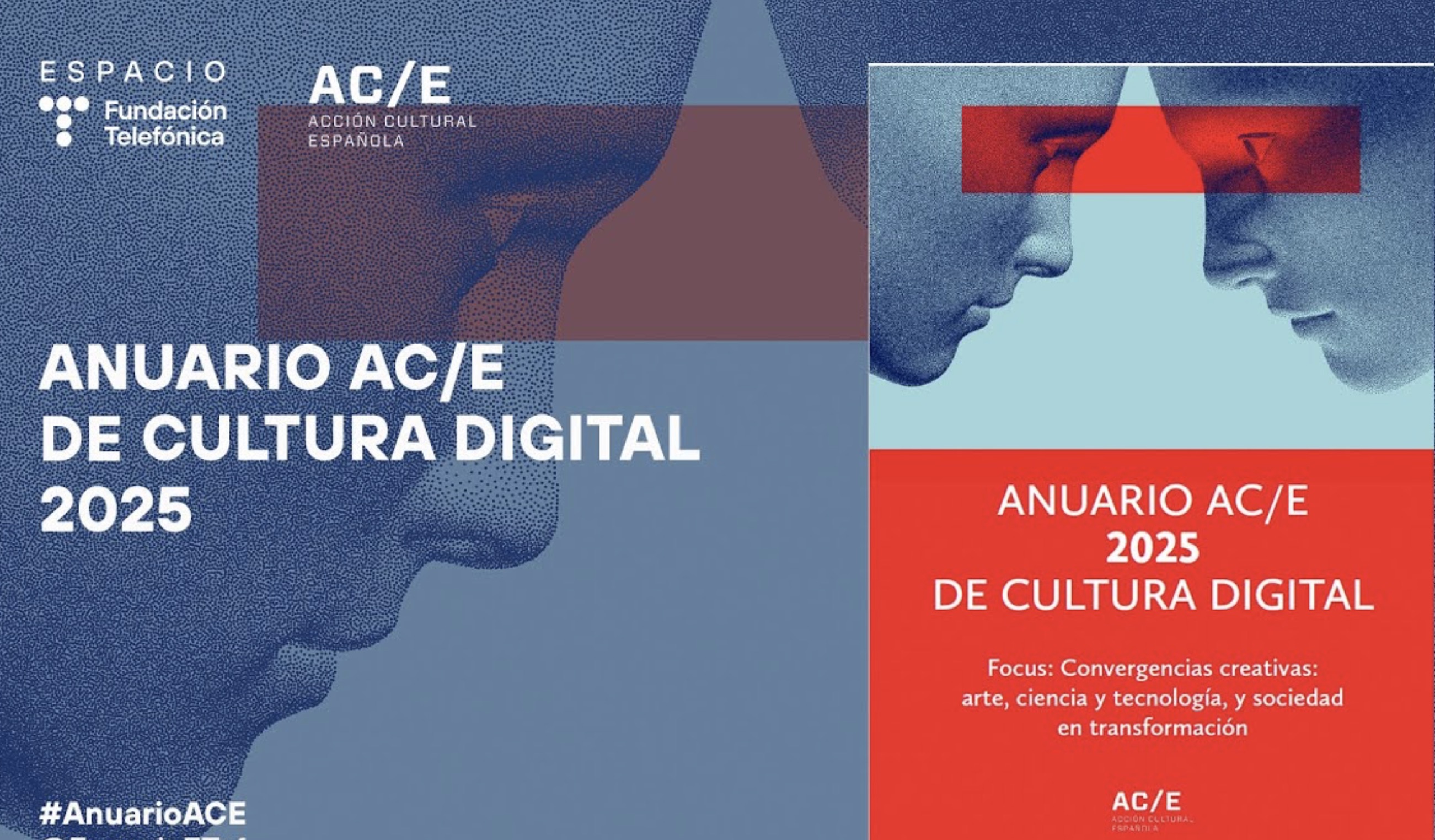Focus: Creative Convergences: Art, Science and Technology, and Transforming Society
Presentation of the AC/E Digital Culture Annual Report 2025
Fundación Telefónica Madrid Space
May 21, 2024, 11:00 a.m.
Programme
10:45-11:00 a.m. Entrance and accreditation
11:00 a.m. Welcome
José Andrés Torres Mora, President of AC/E, and Pablo Gonzalo, Global Director of Knowledge and Culture at Fundación Telefónica.
11:10 a.m. – 11:40 a.m. Focus: Creative Convergences: Art, Science and Technology, and a Changing Society
Conversation between Mónica Bello (author of the Focus) and Inmaculada Ballesteros (Programming Director at AC/E).
11:40 a.m. – 12:20 p.m. Connecting Culture with Youth Mental Health.
Laura Ceballos and Jesús Moreno
Moderator: Javier Celaya
12:20 p.m. – 12:40 p.m. Coffee Break
12:40 p.m. – 1:20 p.m. Coded Futures: Challenges and Horizons of Digital Art Production
José Ramón Alcalá and José Luis Reyes Criado
Moderator: Nuria Rodríguez
1:20 p.m. – 2:00 p.m. Expanded Creativity: New Conversations and the Future of Culture 2030
Manuel González Hernández, Óscar Espiritusanto, and Raquel C. Pico
Moderator: Dani Seseña
Speakers
Mónica Bello: Art historian and curator, she directed Arts at CERN until 2025, which won an award in 2024. She has curated exhibitions such as Quantum Visions and the Icelandic Pavilion at Venice 2022. She was artistic director of the VIDA awards and the Education Department at Laboral Centro de Arte.
Inmaculada Ballesteros: Programming Director at AC/E, holds a PhD in Art History and is an expert in cultural management. She directed the Culture and Communication Observatory of the Alternativas Foundation and is a cultural policy consultant. She has directed cultural centers in Guatemala and Nicaragua.
Laura Ceballos: Professional with experience in marketing and business development, founder of the consulting firm Anthrop1, which focuses on coaching for young people. She holds a master's degree in Ontological Coaching and specializes in the personal and vocational development of adolescents.
Jesús Moreno Pizarro: Psychologist specializing in masculinities and coordinator of the Bróders project of the Social Initiative Foundation, a listening and support platform for young people aged 14 to 19.
Javier Celaya: Member of ADIGITAL and head of institutional relations at ASELID. He has been a member of the editorial committee of the AC/E Yearbook of Digital Culture since 2014 and serves on the editorial board of Telos Magazine.
José Ramón Alcalá: Multimedia artist, curator, and professor of Art and New Media (UCLM). Co-director of the Ibero-American Observatory of Digital and Electronic Arts and former director of Mideciant.
José Luis Reyes Criado: PhD in Social Sciences and History and Arts, researching cultural production and consumption at the intersection of art, science, and technology, especially in festivals. He combines academia with cultural management and consulting.
Nuria Rodríguez Ortega: Professor of Art History and specialist in Digital Humanities (UMA and UCLM). Her research focuses on art terminology and the convergence between computational languages and Art History. She directs the ATENEA R&D project.
Manuel González Hernández: Director of the Spanish National Television program Zoom Net, dedicated to technological innovation and digital culture. He has worked on the creation of cultural television formats and collaborated on virtual reality, video game, and fashion projects.
Óscar Espiritusanto: Journalist, researcher, and professor (Carlos III University), PhD in Media Research, and founder of Periodismociudadano.com. He specializes in media literacy, the impact of AI, and strategies against disinformation.
Raquel C. Pico: Writer and journalist, author of essays such as "Noticias da modernidade" and "Millennials." She writes on current affairs, technology, sustainability, and culture in various media.
Dani Seseña: Journalist, director, and presenter of the program "Cámara Abierta 2.0" (RTVE) on digital culture and social innovation. He holds a degree in Information Sciences and has worked in various media and formats, and co-founded EL RASGO.
The event is co-organized by Acción Cultural Española (AC/E) and the Telefónica Foundation, to mark the publication of the AC/E Digital Culture Annual Report 2025.
The AC/E Digital Culture Annual Report 2025 focuses on the dynamic spaces where art, science, technology, and society converge. Within a framework defined by accelerated technological and scientific transformation, as well as the uncertainty of the present, the yearbook explores the tensions and synergies between artistic practice, science, and technology through the analysis of key moments in recent history.
The central idea of this year's Focus, developed by art historian and curator Mónica Bello, lies in the need to deepen collaboration between cultural, scientific, and technological actors to address current and future challenges. Through exemplary cases and transformative moments, the values that emerge from interdisciplinary dialogue are highlighted, proposing collaborative models oriented toward sustainability, viability, and, ultimately, cultural innovation and the common good. With a primarily European focus and a global aspiration, this work offers valuable tools for institutions interested in promoting creative, diverse, inclusive, and culturally committed spaces.
This edition also features reflections from various authors who explore the intersection of culture and digitalization: Manuel González Hernández analyzes creativity in the age of algorithms as a new creative space; Óscar Espiritusanto explores "IAlogos," artificial dialogues with real intelligences; Raquel C. Pico examines the relationship between culture and the 2030 Agenda; Laura Ceballos addresses global strategies for responsible consumption of digital culture and mental health in young people; Andrew Richard Albanese analyzes the situation of publishers, libraries, and the freedom to read in the United States; Inés Abalo Rodríguez and Paco Calvo explore the connection between plant intelligence and the robotics of tomorrow; Nico Castro reflects on the transformation of professional profiles in the music industry due to digitalization; Yova Turnes presents the DeVuego case on the path toward cataloging and preserving the legacy of video games and their creators; José Luis Reyes Criado analyzes electronic music and digital arts festivals as showcase events. José Ramón Alcalá reflects on the pending history and endangered memory of New Media Art; and Sofía López examines generative AI and its impact on the transformation of the creative cultural industries.





